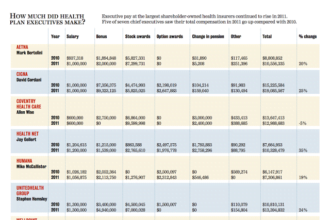An Archives of Internal Medicine article (Conflicts of Interest in Cardiovascular Clinical Practice Guidelines) is getting a lot of notice today. In essence, many of the physicians who develop guideline that influence practice patterns and payment decisions have conflicts. The authors recommend only allowing those without conflicts to write the guidelines. This isn’t a new issue. In 2006 I wrote a piece (Another dirty little secret is out in the open) and am reposting it below because it’s timely: A year ago in Time to deal with medicine’s dirty little secrets?, I wrote about a variety of practices that are relatively well-known in the health care field but would be shocking to outsiders. Industry often takes the blame for “aggressive marketing tactics,” and no doubt some of that is deserved. But physicians are also culpable. The open secrets include the ghostwriting of journal articles by industry sponsors, physicians and academic medical centers holding ownership stakes in companies whose products they are researching, the clinical role sometimes played by orthopedic sales reps, and perhaps the most egregious example: physicians who set guidelines having financial relationships with the companies that benefit from how those guidelines are set. Now we have a new example, which is even more serious than usual. A recent New England Journal of Medicine article blames Eli Lilly for overzealous promotion of Xigris. According to the Boston Globe:
Eli Lilly and Co. funded medical guidelines created for the treatment of [sepsis] in an effort to boost sales of a drug with questionable benefits. The allegation was made by senior scientists at the National Institutes of Health. [They] said Lilly tried to shape the guidelines for use of the drug Xigris by sponsoring a three-pronged marketing campaign
The first two phases are by now almost standard practice in the industry:
- Lilly paid a task force to spread the word that hospitals were rationing Xigris because of its cost, which forced docs “to decide who would live and who would die”
- Lilly “orchestrated” the development of practice guidelines to treat sepsis that called for early use of Xigris (an example of the phenomenon I have described before)
But then Lilly allegedly took a third step, which was a little shocking even to me:
Now, Lilly is sponsoring lobbying efforts to turn the guidelines into quality standards. Hospitals that follow such quality measures receive higher payment from insurers.
What’s happening here? Basically, an influential group of doctors is being lazy and greedy, and Lilly is enabling their behavior. The doctors put their fingers in the cookie jar and Lilly keeps restocking it. The public is paying for the cookies –in the form of higher product sales and sub-optimal health care– and should get fed up! I have no problem with companies using legal means to promote their products, even if their tactics are “aggressive.” They owe it to their shareholders to maximize return on investment. But it isn’t in their long-term interest to push things as far as the medical profession often lets them. Industry leans on the reputations of individual physicians (aka “key opinion leaders”), medical societies (aka guideline writers), and journals to legitimize their marketing messages. It’s up to the medical profession to scrutinize industry claims and issue independent guidelines and quality standards. Sometimes these claims hold up and deserve to be propagated. Sometimes they don’t. If the docs and journals don’t do their jobs they deserve to lose credibility. It’s hard to know the extent to which medical guidelines are already corrupted. The situation is a bit like the incident when the Chinese President’s plane was refitted. In the process of fixing up the plane someone inserted a bunch of listening devices (presumably at no extra charge). When the Chinese checked out the plane and realized it was bugged they had to rip the whole thing up. That’s something like what is going on within the major payers. They’ve stopped treating journal articles and guidelines as objective and have started doing their own analyses. But do we really want to leave health care decisions just to them? Here’s some free advice to the different players in health care:
- Industry: Feel free to market your products and services aggressively, but don’t take things too far. If you do you’ll end up killing the goose that lays the golden eggs. No one will trust doctors, guidelines or journals anymore
- Physicians: Remember that pharma and device companies are not stupid. If they spend money supporting your research or sending you to conferences or sponsoring continuing medical education it’s because they expect to get a return on their investment. It’s awfully hard to remain objective in such instances. Your job is to adopt the best medical practices and put the patient first –sometimes that requires expensive new treatments and sometimes old, cheap standbys are better
- Payers: Go ahead and challenge the objectivity of journal articles and guidelines. On the other hand, don’t pretend that low cost is always synonymous with best treatment. Expect physicians to keep you in line on that.
- Patients: You need to look out for yourself. Find a good, honest physician. Take a look at who’s sponsoring the educational materials you receive. Ask your physician about alternative treatments and do some research yourself








